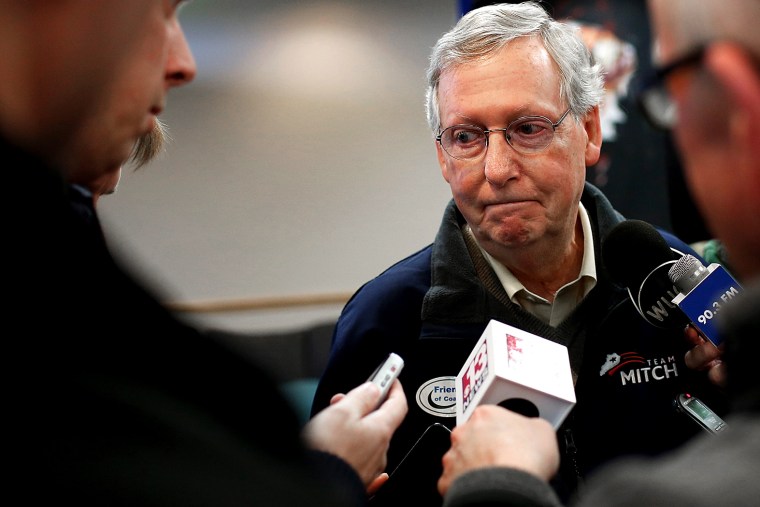Senate Minority Leader Mitch McConnell (R-Ky.), in the midst of the toughest race of his career, still isn't quite sure how he wants to present himself to voters. On the one hand, the longtime Republican senator is proud to be the nation's top obstructionist, helping create the most dysfunctional Congress in modern history. On the other hand, McConnell wants the public to see him as the consummate dealmaker.
To help prove the latter point, the GOP incumbent cited an interesting example last week.
Though he hasn't mentioned it much on the campaign trail over the past year, McConnell specifically touted his effort to push President George W. Bush's plans to reform Social Security in 2005, which would have set up private accounts for retirees. "After Bush was re-elected in 2004 he wanted us to try to fix Social Security," said McConnell. "I spent a year trying to get any Democrat in the Senate -- even those most reasonable Democrat of all, Joe Lieberman -- to help us."
We now know, of course, that Democrats weren't interested in privatizing Social Security. Neither was the American mainstream, which hated the Bush/Cheney idea. But the fact that McConnell brought this up, unprompted, was a clumsy error from a senator who's usually more disciplined.
With time running out in Kentucky, Mitch McConnell decided to remind the state that he wanted to effectively eliminate the popular and effective Social Security system. Indeed, it's been part of McConnell's governing vision for many, many years.
When local reporter Joe Sonka asked McConnell whether voters should expect the senator to push Social Security privatization after the midterms, McConnell replied, "I'm not announcing what the agenda would be in advance."
Wait, he's not?
I'm starting to think Republicans have collectively forgotten the point of a political campaign. Last week, Scott Brown told voters in New Hampshire, "I'm not going to talk about whether we're going to do something in the future." Around the same time, McConnell said he'll only announce Senate Republicans' agenda after the election.
This is a little nutty, even by 2014 standards. Call me old fashioned, but in a democracy, candidates are supposed to tell voters what they'd do if elected. Then, after the election, the winning candidates are supposed to pursue the agenda endorsed by the electorate.
When McConnell says "I'm not announcing what the agenda would be in advance," he's getting democracy backwards. The longtime incumbent is asking voters to give him control of the Senate first, at which point he'll tell everyone what he intends to do with his power.
It's an odd pitch. Either McConnell still intends to eliminate Social Security, replacing it with private accounts, or he doesn't. The senator brought this up as an example of his bipartisan outreach, so it's not unreasonable to ask whether he still intends to pursue an anti-Social Security agenda if McConnell gets a promotion.
This probably isn't the issue McConnell wanted to deal with in the campaign's final week, but he opened the door, and shouldn't be too surprised when others walk through it.
